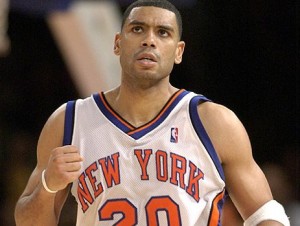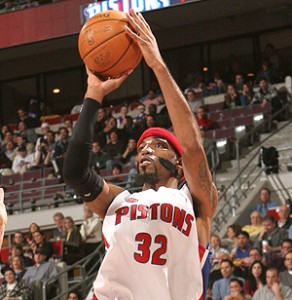One of the topics expected to be discussed during the pending NBA Lockout is the possible revival of The Allan Houston Rule. When a new CBA was agreed upon in 2005, it allowed NBA teams a one time opportunity to waive a player and not have his contract count against the luxury tax teams have to pay if their team salary exceeds a pre-determined amount set by the league. The released player becomes a free agent but his salary still gets paid and counts against his former team’s salary cap. Ironically enough, Allan Houston was not a victim of The Allan Houston Rule. The Knicks instead decided to waive Jerome Williams.
If the new CBA once again invokes this clause, most teams will probably take advantage since it would save them possibly tens of millions of dollars. To keep up with the times, we will change the name of this from “The Allan Houston Rule” to the “Rashard Arenas Rule” since Rashard Lewis and Gilbert Arenas easily have the two worst contracts in the league. Allow me to break down each team and who would end up being the casualties of this rule. Here is the Central Division.
By: David Kay
Chicago Bulls:
The Bulls are probably one of the few teams that would pass up this one-time opportunity. They don’t have any terrible contracts and can afford to pay a luxury tax. If Chicago did decide to exercise this clause, Ronnie Brewer’s remaining two years, $9-plus million might be their only option.
Cleveland Cavaliers:
Here is the likely debate: cut Antawn Jamison who is owed more than fifteen million this season or Baron Davis who will make $28.8 million over the next two seasons. I think the no-brainer decision would be bidding farewell to Davis especially with top overall pick Kyrie Irving added to the fold at the point along with Ramon Sessions. Plus, Jamison’s expiring contract could actually be a useful trade chip at the deadline for a team looking to dump salary and maybe willing to deal a veteran player in addition to a first round pick (kind of like the Cavs did with Davis this past season.)
Detroit Pistons:
Rip Hamilton is scheduled to make $26.3 million in the next two seasons and Detroit has reportedly been proactive in trying to find a suitor to take on his contract. This would be the perfect opportunity to get rid of Hamilton who has practically no trade value. The Pistons could also consider Ben Gordon (3-years, $37.2 million), Charlie Villanueva (3-years, $24.2 million), or Jason Maxiell (2-years, $10 million.)
Indiana Pacers:
With T.J. Ford, Mike Dunleavy, Jeff Foster, and Jamaal Tinsley’s contract coming off the books this summer (yes, Indiana was still paying Tinsley last year), the Pacers only somewhat bad contract belongs to James Posey. The veteran small forward is in the final year of his deal which will earn him almost seven-million dollars this season. Indy is well below the likely salary cap amount so they would not have to pay a luxury tax even if they kept Posey. My guess is they would pass on the “Rashard Arenas Rule”, keep Posey’s expiring contract, and try using it as trade bait during the season.
Milwaukee Bucks:
The 2005 “Allan Houston Rule” could not be used on a player who was acquired after June 21st. If that is the case again this year, then the newly acquired trio of Stephen Jackson, Beno Udrih, and Shaun Livingston would be immune from being released. That means the likely candidate would be Drew Gooden who is still due more than $26 million over the next four seasons. Would general manager John Hammond want to dump Gooden just a year after signing him to a five-year deal? Milwaukee doesn’t really have anyone ready to step into the starting power forward spot so they more than likely don’t take advantage of the clause.
MY ALLAN HOUSTON RULE BREAKDOWN OF THE:
SOUTHEAST DIVISION TEAMS
David Kay is a senior feature NBA Draft, NBA, and college basketball writer for the Sports Bank. He also heads up the NBA and college basketball material at Walter Football.com and is a fomer contributor at The Washington Times Communities.
You can follow him on Twitter at DavidKay_TSB.

